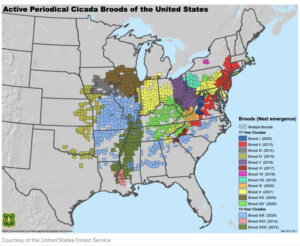
Brood or Bust: Will the 2021 Cicada Cycle Help Turkey Poult Production
The cicada plague will soon be across much of the eastern United States this spring. Once again these mini beasts will awake from their hiatus and emerge from the earth’s surface in biblical numbers. Unlike the 10 plagues that occupied Egypt we do not have Pharaoh to blame nor will they be more than a minor inconvenience. And if you’re a turkey hunter the cicadas can actually be a welcoming sign of productive times to come.

Here’s what they are and how they can help next year’s spring hunt.
Why are all these bugs in my yard?
Cicadas are present every year in some capacity, with each year representing a different brood. 2021 marks the 17 year cicada, otherwise known as Brood X. Once the soil temperature reaches 64 F the red eyed bugs will begin to emerge from the soil to breed. The hum from the males resembles a lawn mower you can’t shut off, but luckily the mowing stops at dark as the bugs are mostly quiet at night. Cicadas live a simple life during their brief time on the earth’s surface,about a month, with the only goal being to breed for the next generation. Sad as it may seem, this mate-then-die life cycle is common in the insect world and has proven to be quite effective.
I Don’t Care About the Bugs, How Do They Help the Turkeys
The most obvious benefits Cicadas bring for wild turkeys is the abundance of food they present. While temporary, the influx of an easily obtained food source comes at a crucial time. Cicadas give poults access to high protein food with minimal work. More importantly, Cicadas provide an easy meal for animals that prey on nests and poults.
Predator satiation– the idea that predators fill up on abundant, alternative food sources for a period of time. In a University of Purdue study racoon diets consisted of 51% cicadas during the emergence. Other nest predators like possums and skunks also feed on cicadas during the outbreak, drastically lowering the pressure on nesting hens and increasing the survival rate of poults.
Measuring Productivity
Jake recruitment is an easy way to test the cicada theory. Finding many groups of jakes the year following the presence of cicadas gives a great visual for how many successful nests there were the year before. The Purdue study took it one year further and recorded roadside gobbling data two years after the cicadas were gone. What they found was an uptick in gobbling activity and many turkeys making their presence heard.
“One example of how the 17-year cicada emergence can impact wildlife relates to wild turkeys. During the last emergence in Indiana in Wild Turkey Brood Production – Summer 2005, turkey productivity (poults/hen) increased an estimated 83% compared to 2003 and was 52% higher than the average productivity from 1993-2020. According to Indiana DNR Wild Turkey Biologist Steve Backs, this increase was related to 2 major factors; good weather during nesting and brooding season and an abundance of cicadas.(Jared Brooke, Purdue)”
It’s All Good News, Right?
Cicadas occupying the landscape does bring good times for wild turkeys, but having better hunting the following years isn’t a done deal. Cold rains in early June still negatively impact poult survival-all the food in the world can’t save a young turkey from being exposed to a cold, detrimental rain event. Cooler climates can still see dips in poultry retention even in a cicada year as food is only part of the equation. This isn’t an attempt to slow your enthusiasm but merely reciting the idea that nature has many variables and just because one factor is off the charts it doesn’t mean the rest are overwhelmingly good and equal success.
With that said, if you’re a turkey hunter you have reason to enjoy our little red eyed friends. Know that scraping bugs off the patio or opening the windows to enjoy the subtle hum this spring could lead to better days in the turkey woods.









